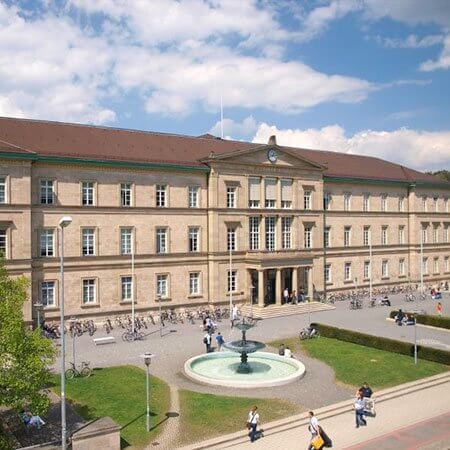Endometrioid ovarian cyst
Due to the difficulties associated with the organization of treatment in Turkey, Switzerland, South Korea and India, we are not currently processing requests to these regions.
If you are interested in treatment in Germany, please leave a request and our specialists will contact you as soon as possible.
Endometrioid ovarian cyst is a pathological growth of tissue, morphologically identical to the inner layer of the uterus (endometrium). This is one of the clinical forms of genital endometriosis. This disease mostly affects women of fertile age. Only 6% of patients, who are diagnosed with an endometrioid cyst for the first time, are over 50. In 70-90% of cases endometrioid ovarian cyst is accompanied by endometriosis of another localization, or another disease of the reproductive system.
The Booking Health portal presents 72 German clinics specializing in endometrioid ovarian cyst treatment
Show all clinics
Endometrioid ovarian cyst – Diagnostics
Doctor can suspect endometrioid ovarian cyst on the basis of patient’s complaints and through gynecological examination. Further, following visual techniques help to assess its size and location:
- Ultrasound examination
- Spiral CT scan
- MRI
The majority of patients have just one cyst in one ovary. This is 81% of patients. 16% of women have 2 cysts, 2.5% have 3 cysts and 0.5% have 4 and more endometrioid cysts. In 90% of women cysts’ size is under 7 cm.
Stages of endometrioid ovarian cysts are:
- Stage 1. There are small formations on the ovary surface that don’t have cavities.
- Stage 2. A cyst of one ovary that has a cavity with a diameter under 6 cm.
- Stage 3. There is one cyst of more than 6 cm in diameter on the first ovary and small formations of endometrial tissue on the second one.
- Stage 4. There are cysts on both ovaries, more than 6 cm in diameter.
Laparoscopy is performed for the diagnosis confirmation.This is a surgical method for diagnosis and treatment of endometrioid cysts. It allows to penetrate into the pelvic cavity and to take a biopsy for the examination.
Best clinics for the endometrioid ovarian cyst diagnostics in Germany:
Endometrioid ovarian cyst – Treatment
The surgical treatment is a basic one. It is connected with oncological alertness and low effectiveness of drug treatment. Any cyst that doesn’t regress during 8 weeks has to be removed.
Surgical treatment. All the patients undergo laparoscopy which is aimed at the removal of ovary part or endometrioid cyst. Surgeons cut the formations out. Otherwise, when the cyst is small or a woman wants to preserve reproductive function, it is possible to destroy the formations by ultrasound, laser, cryodestruction (freezing) or other methods of physical influence.
Meanwhile, surgeons remove the adhesions that violate permeability of the fallopian tubes and prevent the conception of the child. If necessary, endometriosis foci are removed in the other organs. Volume of the surgery depends on the extension of endometriosis and the necessity to preserve woman’s fertility (if she is in the fertile age and is planning to have kids in the future).
Medicamentous treatment presupposes prescription of the hormonal drugs that slow down the growth of endometrioid ovarian cysts. It is performed after surgery or instead of it, if a cyst is small, a woman doesn’t plan to have kids, and the disease is asymptomatic and doesn’t affect the quality of life.
Empirical drug therapy (without confirmation of the diagnosis by laparoscopy) is not usually performed, because supposed endometrioid ovarian cyst might be a tumour.
Best clinics for the endometrioid ovarian cyst treatment in Germany:

University Hospital Tuebingen

University Hospital Rechts der Isar Munich

Helios Hospital Berlin-Buch
Endometrioid ovarian cyst – Rehabilitation
Rehabilitation is the process of body restoration after the diseases or surgical methods of treatment. General therapeutic rehabilitation is indicated for patients after conservative and surgical treatment of the internal organs diseases.
The most modern rehabilitation programs are used in Germany. They are adapted individually for each patient, and are based on the recent disease and methods of treatment, age, physical possibilities, and the results of treatment. Different specialists such as: therapists, physiotherapists, psychologists are involved in the process. Rehabilitation contributes to restoration after surgical interventions (prevents the formation of adhesions and cosmetic scars, eliminates pain, helps to restore the function of the reproductive system).
Rehabilitation also includes medicamentous support. Usually, this is administration of combined oral contraceptives. Such therapy normalizes the hormonal status, restores the menstrual cycle regularity and serves as a preventive measure for relapse of the disease.
Rehabilitation programs in Germany are designed for 2 weeks. If necessary, they can last much longer. In this country, the patient is provided with qualitative care, accommodation in comfortable rooms and individually selected meals.
Rehabilitation programs in Germany show one of the best results in the world. Most patients successfully restore their employability and excellent health there. They remain physically active, return to the full social and family life.
Best clinics for general therapeutic rehabilitation in Germany:
Authors:
The article was edited by medical expert, board certified Dr. Nadezhda Ivanisova. For the treatment of the conditions referred to in the article you must consult a doctor; the information in the article is not intended for self-medication!
Sources:
The cost of services includes
Here you can find the cost of treatment for this disease at the German University Hospitals. Leave a request and we will provide a free consultation with a doctor and will start organizing the whole treatment process.
The program includes the following:
- Issuing of an invitation for getting a visa for treatment as quick as possible
- Fixing an appointment at a time convenient for you
- Preliminary organization of a comprehensive examination and discussion of the forthcoming treatment plan
- Arranging transfer from the airport to the hospital and back to the airport
- Provision of interpreting services and services of a personal medical coordinator
- If necessary, assistance in the organization of further surgical treatment
- Provision of a medical insurance against treatment complications covering up to 200,000 euro
- Preparation and translation of medical records and recommendations from the hospital
- Assistance in the subsequent communication with your attending physician, including consultations on repeated X-ray images through the unique medical document management system E-doc



